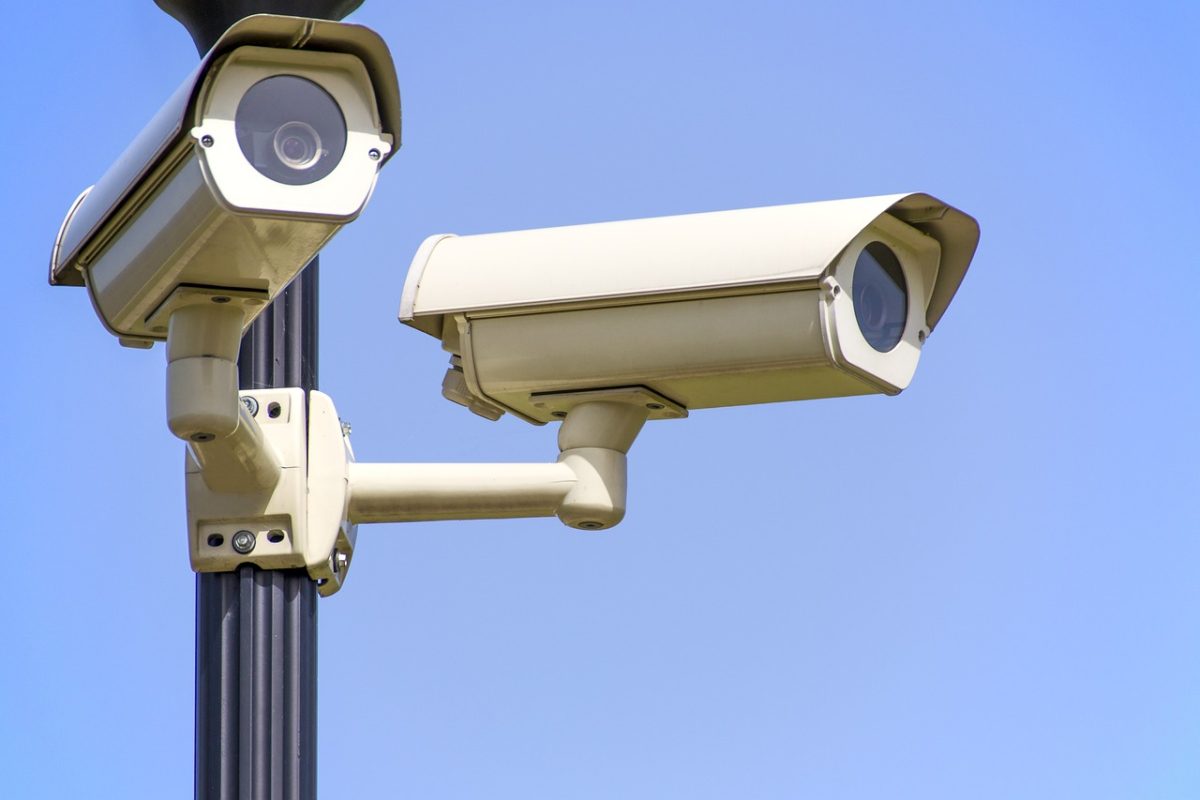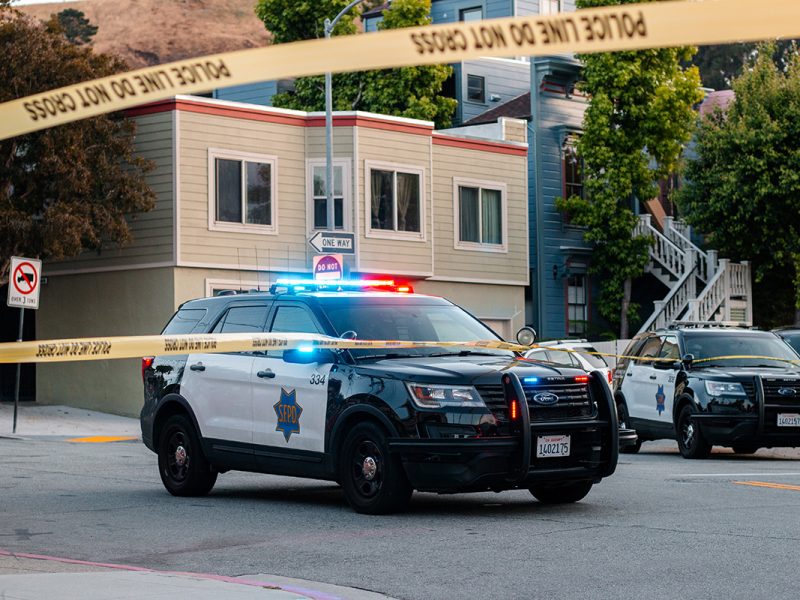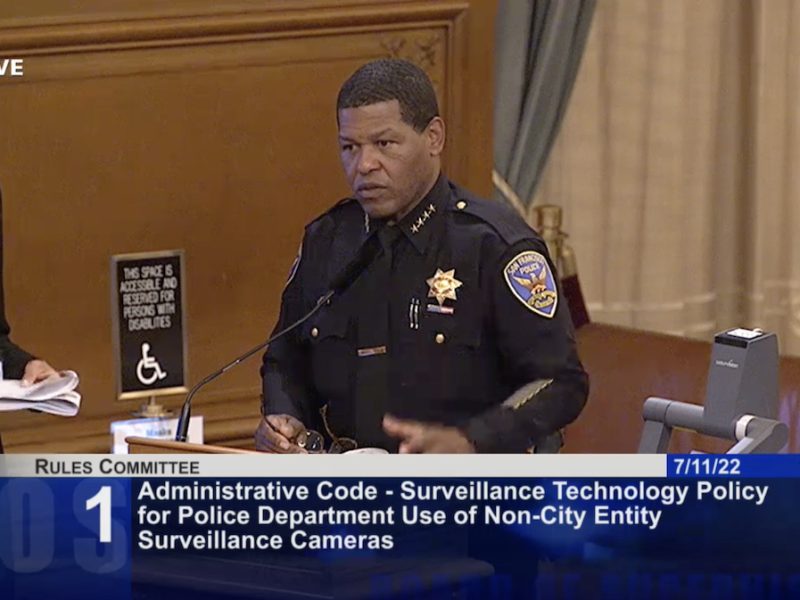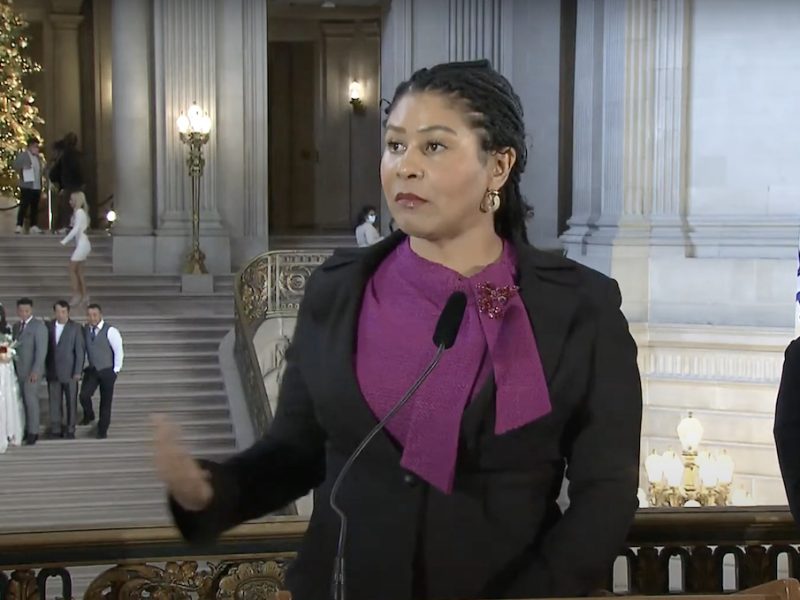This is the second of a two-part series detailing the possible effects of Proposition E, Mayor London Breed’s police department ballot measure. You can read the first part here.
Most of the attention on Proposition E, Mayor London Breed’s ballot measure that has raked in more than $1.4 million and appears to be coasting toward victory, has focused on police chases and reducing the power of the Police Commission.
Another change? New technology, a cornerstone of the measure that would see the police department exempted from requirements placed on every other city department in a bid to allow for easier experimentation. That could mean drones, facial recognition technology and surveillance cameras.
The latter is a pet project of one of the measure’s chief financiers, tech executive and billionaire Chris Larsen, who has, for years, funded a private network of cameras that he believes bolsters police work.
But he isn’t the only one to put up cameras. Current city law says any city department can propose and get approval from the Board of Supervisors for its surveillance plans. The San Francisco Municipal Transportation Agency has done so for about 15,000 cameras around the city, and the Recreation and Parks Department for done so for its few hundred.
Police, when investigating crimes, already access these cameras. Prop. E, however, would let the SFPD skip the approval process SFMTA and Rec and Parks underwent.
“It’s a massive leap backward, because San Francisco has some of the more advanced privacy-oriented legislation in the country,” said Matthew Guariglia, a policy analyst at the Electronic Frontier Foundation. “In many cities, communities have no control over what technologies their police buy, how they use them, when they use them.”
In an interview with Mission Local, Larsen said the new cameras under Proposition E would allow police to select “troubled” spots in the city and with cameras acting as a “force multiplier” for a short-staffed police department.
“It depends how you do them, right?” Larsen said. “So if it’s [like] London? Fuck no, that’s crazy. New York, too — they go way too far.”
Cameras, drones and facial recognition
Since 2019, San Francisco has required oversight over city departments that wish to use surveillance technology, a law meant to prevent unchecked government surveillance and imperfect new technologies.
Prop. E would exempt new police drones and surveillance cameras from the city’s technology ordinance altogether, meaning those technologies would not require a policy approved by the Board of Supervisors, and could incorporate facial recognition technology that’s otherwise banned in the city. (Currently, the police department does not report having its own surveillance cameras in operation, but issued preliminary plans for new drones in 2023.)
read more on proposition E:
San Francisco banned facial recognition technology as part of the 2019 surveillance ordinance. Facial recognition is controversial, not least because it has failed to distinguish between Black people, and has led to wrongful arrests, including in Michigan, New York and Georgia.
The City Attorney’s Office, for its part, has said Prop. E would create a loophole allowing for facial recognition, despite the city’s ban.
Its ballot simplification document reads that a “yes” vote on the measure would “authorize the SFPD to use drones and install surveillance cameras without Commission or Board approval, including those with facial recognition technology.”
The Electronic Frontier Foundation, however, believes the 2019 ban would override Prop. E.
“Our attorneys believe that the facial recognition ban is pretty clear: The government cannot use it, in any form,” said Guariglia. “This proposition, as written, does not change that.”
Larsen, the Ripple chairman and a major backer of the measure, dismissed the possibility of San Francisco becoming a surveillance state like other cities. He scoffed at the prospect of drones “flying in your face, scanning you and then shooting you” as “bullshit.”
The City Attorney’s Office declined to comment further on its interpretation of the ballot measure.
Currently, the police department already has access to the thousands of private and city-operated cameras around the city: It can access the cameras operated by various community benefit districts, as well as acquire footage from or live-monitor cameras owned by individuals and private security companies.
When tech executive Bob Lee was killed in April 2023, for instance, police were able to retrace nearly every move he made in the hours and minutes before and after his stabbing.
Police-operated cameras, however, would come with the risk of putting certain communities “under a microscope,” said Guariglia. Selective surveillance with police installing cameras in specific areas of the city, he said, could result in disproportionate policing of already marginalized communities.
New technologies have been problematic in the past
And, under Prop. E, the police department could use new, unvetted technologies for up to a year without any oversight.
New policing technologies used without safeguards can — and have — failed. In San Francisco, off-duty Muni driver Denise Green was stopped by police near 24th and Mission in 2009, and held at gunpoint by officers using an automatic license plate reader.
The problem? It misread her plate. Officers, without double-checking the plate numbers, rushed to surround and search Green, who ultimately received a hefty settlement. The case also triggered new restrictions on such technologies.
“Simply put, allowing the San Francisco Police Department to beta-test unproven and damaging surveillance systems on the rest of the city is a recipe for a civil rights and public safety disaster,” said Matthew Cagle, an attorney with the American Civil Liberties Union of Northern California.
As one of the initiative’s biggest proponents, Larsen said the limits and guardrails written into Prop. E, like camera footage being retained for only 30 days, are sufficient to protect the privacy of San Franciscans.
“The truth is, we do it better than anybody,” Larsen said, “We’re always going to be the most privacy, civil rights-oriented place on the fucking planet.”
Others still question why the police department shouldn’t follow extant city processes to implement new technologies — as all other city departments do, and will continue to do. The process has not prohibited technology use: Despite much opposition, the Board of Supervisors passed a controversial new policy in 2022 allowing police to live-monitor privately owned cameras.
But again, the move to relax the policy is coming from Breed, who has been pushing back on the city’s surveillance law for years, saying it has “hobbled law enforcement.”
“The idea that they can’t get new technology unless they gut our entire system of police oversight and transparency is absolutely ridiculous,” Guariglia said. “It sounds like the police just want a system where they’re not accountable to anybody for using technology which could be biased or dangerous or just ineffective generally.”






I think it works. Just the other day I was just about to steal an ATM machine from a local business, until I saw the camera and thought again.
Again, “thing solutions” are promoted over “people” solutions.
Things are relatively cheap and make profits for a few. People can be costly and unpredictable.
With video data, there may be time to dissect a crime, as was done with the murder of a Bob Lee. But it is useless until after a crime is committed, and not before (unless we completely abandon the principle of “innocence before proving guilt” by monitoring cameras in real time and making predictions).
Also, cameras are only as good as the people who watch them, and I don’t expect people relishing the idea of being glued to them or having to roam through miles of video footage.
And don’t people who spend their days monitoring cameras sort of turn themselves into things? What a dreary way to live!
And what of us? Already living in a world of constant surveillance? I’m more tempted to spite it by picking my nose more often!
It would be nice if San Francisco took a lead in showing what radical, human-centered solutions could do for our world— especially in the fields of education and health.
Can a potty-mouthed backer of Prop E care as much about those?
Robert,
An AI ‘robot’ won’t get tired of digging through everything and everyone.
AGI will ID everyone in a busy intersection and tell you where they have been and are likely headed and your likely votes in the last several Presidential elections.
I calm my fears when things get too complex with my new ‘religious’ faith.
Which is that we’re living in a computer simulation.
Go Athens over Sparta !!
The only potty mouths in this comment section are the opponents of Prop E.
cardinal,
Your comment stands out as I return to this thread.
Only profanity anywhere in Eleni’s article are direct quotes from Chris Larsen whom I don’t believe is an opponent.
Some of us run long here but within this forum there’s no obscenity amongst regulars.
Not that I’m opposed to Sailor Talk.
lol
h.
Not London, not New York? Why not? Because “We’re always going to be the most privacy, civil rights-oriented place on the fucking planet?” Not if the Billionaire Boyz get their way. Nothing is more important than their money and supersized egos. This undoubtedly comes from the Police Officers Association, our community pillar of civil rights, transparency, privacy and security. And what is wrong with all those cameras already operating that police can access? Aren’t they multiplying force enough? To hear the supporters of E talk, you would think there were only 10 cops in the whole city, and all their time is taken up writing reports on use of force. Really? Do the cops use force so much it takes them forever to report it? E is “safety theater” — precisely what we expect from Breed and the Boyz. They can’t come up with anything reasonable, because let’s face it, reason is not their strong suit.
Mark,
None of you take the long view.
As one of the people who broke up a thousand fights on playgrounds started by their own students I’m here to tell you …
The people robbing and raping and killing have often been students of mine or some other ‘Behavior’ teacher working in Self-Contained classrooms or jails or prisons or, I’ve even worked at a camp in the Redwoods outsdie of Guerniville where the students slept in dorms on paper but in reality lived in the woods …
The common denominator for these students is that they were raised by parents who did not want them or Foster homes looking after them for profit.
No Love.
Solution is to Pay fertile criminals to get Sterilized.
No one who was not born has ever committed a crime.
Tho Alabama may disagree.
h.
The American Civil Liberties Union (ACLU) is opposed to the measure.
Does anyone believe that the SF Mayor’s Office, SFPD, or our techno-capitalist overlords really want to look after our civil liberties?
Big Brother enthusiastically supports Prop E. You will vote for it, won’t you, citizen?
Yes. I will.
A minion of the techlords speaks!
I, for one, support our new tech overlords
Don’t suspect your friends, use facial recognition technology to turn them in!
This is what direct rule by crypto swindlers looks like.
The thing about remote cameras is that people need to see these are present for them to be a deterrent. Big signs, like, “Smile, you’re on camera.” would help.